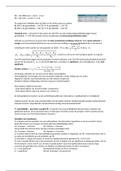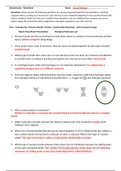The end of legal subjectivity
At what moment is legal subjectivity terminated?
The natural person’s legal subjectivity is terminated by his/her death.
In terms customary law, however, death does not necessarily terminate a person’s
legal subjectivity. The judicial capacities, duties and rights of the deceased are
transferred to the heir who may either be a male or female. Unlike in civil law
where the executor of the estate ‘steps into the shoes of the deceased’ for the
duration of that executor’s mandate, the customary law heir (indlalifa) ‘steps
into the shoes of the deceased’ forever.
At what moment does the death occur?
Death is traditionally associated with the permanent cessation of the vital
functions of the brain. This is called somatic death. Somatic death occurs with
the permanent cessation of the functions of the vital nerve centers of the
brainstem, and the individual ceases to exist as a functional whole.
In traditional African communities, they view death differently seeing as it is
regarded as being in ‘deep’ sleep.
How can death be defined?
As legal subjectivity is terminated by death under civil law, a dead body neither
has rights nor obligations and is a thing. The law protects the deceased’s body
and regulates its handling and disposal. This is done to protect interests such as
public health, respect for the feelings and sensibilities of the deceased’s relatives,
and respect for the dead.
The National Health Act adopted the criterion of brain death as the legal standard,
but this only applies to the specific matters governed by the Act. Courts are
therefore not bound by the definition in circumstances where the Act does not
apply and will rely on the medical evidence to determine whether someone has
died, and at what moment the person died.
The disposal of the body of the deceased in customary law:
In terms of customary law, death does not necessarily terminate a person’s legal
subjectivity. The deceased is considered to be in deep sleep and his or her spirit
(badimo amadlozi) is always around living people. In most cases, the badimo or
amadlozi are entitled to the same legal duties, rights and privileges arising out of
customary law as if they were living human beings.
Proof and consequences of the death of a legal subject:
The death of a natural person has important legal consequences. These
consequences set in as soon as it is proved that a person is dead. The death of a
person has to be proved and this can be done in the following two ways:
1. Death certificate
A persons death is usually proved by means of a death certificate which is
issued by a medical practitioner. If the death was due to natural causes,
the certificate indicates the cause of death. If the death was due to
, unnatural causes or if there is an assumption that the death was due to
unnatural causes, an inquest is held.
In the case of an inquest, the practitioner must issue a certificate as soon
as he/she is satisfied that the corpse is no longer required for the inquest.
The cause of death is not stated on this case.
Once the death has been reported to the Director-General of the
Department of Home Affairs and registered, an official death certificate is
issued. The death certificate is prima facie proof that the death of the
person identified. Meaning the death certificate can be accepted as the
proof of death unless otherwise proved.
2. Direct evidence
When it is not possible to take a medical practitioner to the body of the
deceased to issue a death certificate, direct evidence is used to prove the
death.
Proof of death is important for two reasons: first, once death has been proved,
the deceased’s estate may be administered and distributed among heirs; and
second, the surviving spouse or civil union partner, if any, may enter into a new
marriage or civil union.
Presumption of death:
An issue arises when a person disappears and there is no evidence that he/she is
in fact dead. A missing persons estate cannot be administered, his/her insurance
policies and pension cannot be paid out and the missing person’s spouse/partner
cannot enter unto a new marriage or civil union.
Private person approaches
court
Presumption of
death in terms of
common law
It must be proved on a
balance of probabilities that
the person is dead
Presumption
of death
State takes the initiative
Presumption of
death in terms of
the Inquests Act
58 of 1959 Magistrate must be certain
beyond reasonable doubt that
the person is dead
At what moment is legal subjectivity terminated?
The natural person’s legal subjectivity is terminated by his/her death.
In terms customary law, however, death does not necessarily terminate a person’s
legal subjectivity. The judicial capacities, duties and rights of the deceased are
transferred to the heir who may either be a male or female. Unlike in civil law
where the executor of the estate ‘steps into the shoes of the deceased’ for the
duration of that executor’s mandate, the customary law heir (indlalifa) ‘steps
into the shoes of the deceased’ forever.
At what moment does the death occur?
Death is traditionally associated with the permanent cessation of the vital
functions of the brain. This is called somatic death. Somatic death occurs with
the permanent cessation of the functions of the vital nerve centers of the
brainstem, and the individual ceases to exist as a functional whole.
In traditional African communities, they view death differently seeing as it is
regarded as being in ‘deep’ sleep.
How can death be defined?
As legal subjectivity is terminated by death under civil law, a dead body neither
has rights nor obligations and is a thing. The law protects the deceased’s body
and regulates its handling and disposal. This is done to protect interests such as
public health, respect for the feelings and sensibilities of the deceased’s relatives,
and respect for the dead.
The National Health Act adopted the criterion of brain death as the legal standard,
but this only applies to the specific matters governed by the Act. Courts are
therefore not bound by the definition in circumstances where the Act does not
apply and will rely on the medical evidence to determine whether someone has
died, and at what moment the person died.
The disposal of the body of the deceased in customary law:
In terms of customary law, death does not necessarily terminate a person’s legal
subjectivity. The deceased is considered to be in deep sleep and his or her spirit
(badimo amadlozi) is always around living people. In most cases, the badimo or
amadlozi are entitled to the same legal duties, rights and privileges arising out of
customary law as if they were living human beings.
Proof and consequences of the death of a legal subject:
The death of a natural person has important legal consequences. These
consequences set in as soon as it is proved that a person is dead. The death of a
person has to be proved and this can be done in the following two ways:
1. Death certificate
A persons death is usually proved by means of a death certificate which is
issued by a medical practitioner. If the death was due to natural causes,
the certificate indicates the cause of death. If the death was due to
, unnatural causes or if there is an assumption that the death was due to
unnatural causes, an inquest is held.
In the case of an inquest, the practitioner must issue a certificate as soon
as he/she is satisfied that the corpse is no longer required for the inquest.
The cause of death is not stated on this case.
Once the death has been reported to the Director-General of the
Department of Home Affairs and registered, an official death certificate is
issued. The death certificate is prima facie proof that the death of the
person identified. Meaning the death certificate can be accepted as the
proof of death unless otherwise proved.
2. Direct evidence
When it is not possible to take a medical practitioner to the body of the
deceased to issue a death certificate, direct evidence is used to prove the
death.
Proof of death is important for two reasons: first, once death has been proved,
the deceased’s estate may be administered and distributed among heirs; and
second, the surviving spouse or civil union partner, if any, may enter into a new
marriage or civil union.
Presumption of death:
An issue arises when a person disappears and there is no evidence that he/she is
in fact dead. A missing persons estate cannot be administered, his/her insurance
policies and pension cannot be paid out and the missing person’s spouse/partner
cannot enter unto a new marriage or civil union.
Private person approaches
court
Presumption of
death in terms of
common law
It must be proved on a
balance of probabilities that
the person is dead
Presumption
of death
State takes the initiative
Presumption of
death in terms of
the Inquests Act
58 of 1959 Magistrate must be certain
beyond reasonable doubt that
the person is dead










